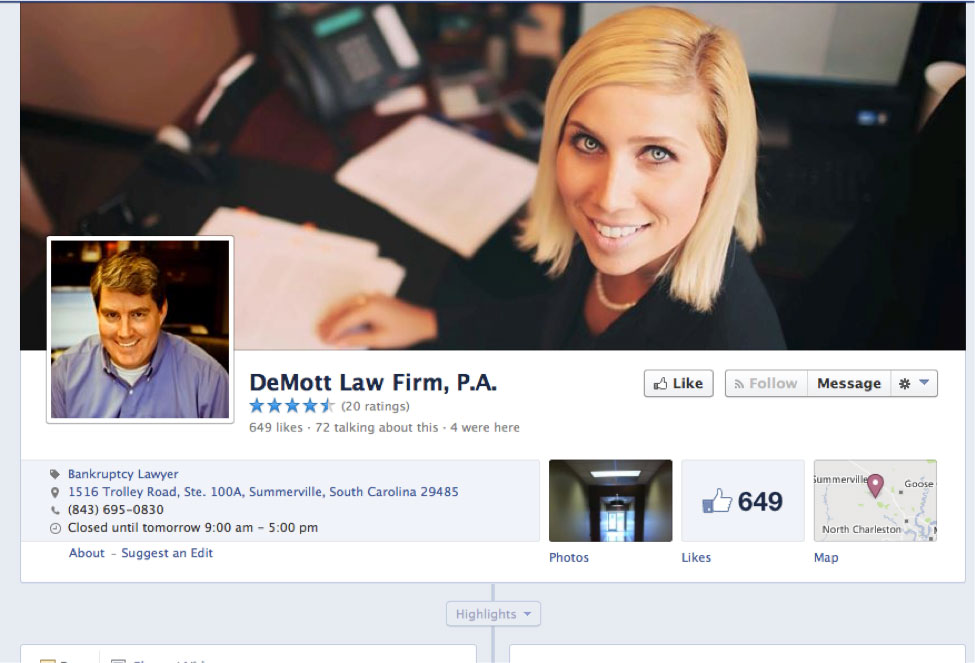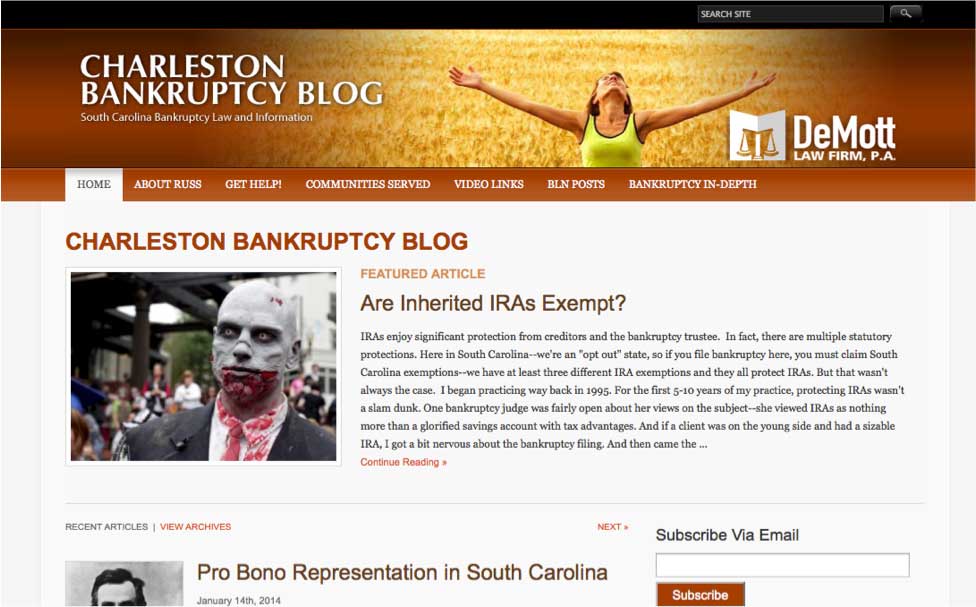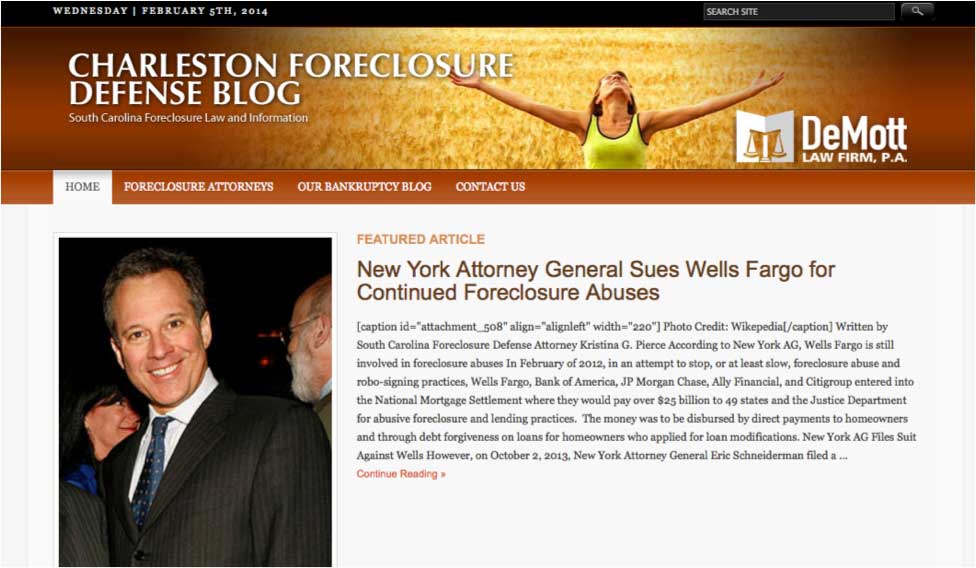This bankruptcy attorney went solo in a new city and had no money for marketing. Now he has a steady flow of referrals. Here is how he did it.
When you’re a bankruptcy and foreclosure solo practitioner starting out in a new city, effective marketing is critical. Unfortunately, some types of marketing can be costly, and a bankruptcy solo practitioner’s marketing budget is typically not very big.
“I do bankruptcy and foreclosure defense, and we just don’t make a lot of money on any given case,” says Russell DeMott, founding attorney at DeMott Law Firm. “It’s not like personal injury where an attorney might have a half-a-million dollar or million dollar settlement and get a third of that. It’s a thousand dollars here and fifteen hundred dollars there. Or it might be three or four thousand dollars potentially, but you’re talking about a lot of work for a fairly modest fee. And you don’t keep all of the money—because you have staff and office costs.”
For this reason, everything the firm does, including marketing, has to be cost-effective with a good return on investment.
“People make the mistake of just throwing money at things and you have to be very surgical about how you spend your money,” DeMott says.
This case study will examine how DeMott Law Firm combined traditional marketing with modern-day marketing to create a steady stream of referrals to its practice.
The Challenge
In 2005, attorney Russell DeMott moved his practice from Michigan to South Carolina and joined forces with another attorney. Five years later, they amicably split to focus on different areas of law.
DeMott went from being in a small firm to becoming a solo practitioner, and he knew he’d have to get crafty with his marketing efforts if he was going to continue to bring in business without spending a lot of money.
“Look at billboards, for example,” DeMott says. “Look at the cost of a billboard, and it’s two or three thousand dollars a month. You have to figure out, how many clients on average is that going to have to bring me for it to be cost-effective? That’s the greatest challenge in my practice of consumer bankruptcy.”
DeMott needed to focus his marketing efforts in places where he could get a good return on investment, for little to no expense.
The Actions
While some firms still do what DeMott calls “1959 Marketing,” many have moved away from it in favor of pay-per-click advertising, social media, and email marketing. But that doesn’t mean that “1959 Marketing” is dead. Far from it.
“I have consistently over the years done what I call ‘1959 Marketing,’ which is just old-fashioned attending events; taking people to lunch; letting them know what you do; if they refer a client, I send a thank you note,” he says. “The same things lawyers did in 1959 to get cases. Just old-fashioned getting to know people and telling them what you do.”
The “old way” of doing things is still as valuable today as it was back in 1959.
Don’t shy away from getting out there and making connections, especially with lawyers who you can have mutually beneficial referral partnerships with.
“Look at who would be a natural feeder for your firm’s referrals,” he says. “For example, a couple weeks ago I met an attorney who deals with security clearance issues,” he says. “So one of the mutually beneficial things we talked about is security clearance. Her people have debt problems that I can get rid of so they don’t lose their security clearance. And I have people who are thinking about filing bankruptcy and want input from somebody who knows that area, who really deals with that agency and writes those applications and responses, which I don’t.”
Referral partners will vary from firm-to-firm, so start with people or places that would be good sources of potential clients for your firm.

2. Focus On Low-Cost, High Return
Since his firm has little to no marketing budget, DeMott has had to capitalize on the things he can do for a small amount of money or no money at all. So he chose to focus on using the one resource he had that was plentiful: his time.
“There’s the saying that time is money, but in terms of cash outlay for somebody that’s solo or a small firm, particularly a start-up, the attorney’s got a lot of time but not a lot of money,” DeMott says. “Take what you do have, which is time, and leverage it as best you can.”
He decided to amp up his blogging efforts and use of social media. DeMott launched a new DeMott Law Firm website, as well as two blogs: the Charleston Foreclosure Defense Blog and the Charleston Bankruptcy Blog.
He also has a presence on Facebook, Twitter and LinkedIn. He uses his firm’s social media pages to help promote the original content he creates.
“I cross-pollinate by posting [links to]the blog posts on the Facebook page,” he says.

3. Think About What Keeps People Up At Night
Part of what’s helped DeMott be successful with his blogging efforts is that he takes the time to really think about who his audience is and what problems they’re dealing with. He puts himself in the shoes of the people he wants to work with, and then chooses his blog topics based on that.
“I’m writing for people who are awake in the middle of the night and worried about how they’re going to keep their house; or what can Visa and Mastercard do, they’ve threatened me, and what’s gonna happen?” he says.
Because DeMott is so focused on solving problems and answering questions with his blog posts, he tends not to write very many articles with search engine optimization in mind.
“I haven’t really gotten into trying to write for the search engines,” he says. “What I’ve done is written on topics that come up in my practice, that people are talking to me about. My thought was, if people are having these conversations with me over the phone, if they’re calling me or they’re worried about these things or asking about these things, then those are probably good prospects to write about.”

4. Be Entertaining and Interesting, Especially for Yourself
When it comes to the content for your blog or for sharing on social media, you have to be entertaining and educational if you want people to pay attention.
“I try to keep it entertaining and funny,” he says. “Sometimes I’ll start writing about a topic and I’ll totally change course in the middle of it and switch around how I was writing about it or how I explained it. I just want to put fresh content out there that consumers are gonna like and that they’re gonna read.”
DeMott warns, however, that while writing for your target audience is important, it’s also important to write for yourself.
“Sometimes I just write about something I want to write about,” he says. “I start writing and [then]I think, I don’t know if anyone wants to read about this, but I want to write it. And as long as it fits the core theme that I have, which is addressing financial problems, I write about it. You have to make it interesting for the people who are reading it, but you’ve got to make it interesting for you or you won’t want to write about it.”
Consistent Referrals from Other Attorneys
With the combination of “1959 Marketing” and having a website and multiple blogs, DeMott Law Firm has been able to accumulate a steady stream of client referrals.
“I can think of a list of attorneys that know me and they regularly send cases to me,” he says.
649 Likes on Facebook, 840 Twitter Followers, 500+ Connections on LinkedIn
Blogging regularly and sharing blog posts on social media sites has helped DeMott to grow his firm’s web presence, as well as introduce people to how he can help them solve their financial problems.
DeMott says that it’s important to know yourself and what makes you tick, in order to find the best marketing techniques for your firm.
“You have to assess your own personality type and you really have to go with what you’re comfortable with,” he says. “I’m comfortable talking to people and being social with people, and getting out there. There may be other people who aren’t, and maybe they write in a more academic style, so they can get published in bar journals. Other people are great at video blogging, but they wouldn’t want to write. They want to explain it orally in front of a camera.
“Some people are behind the scenes and some people want to get out there and meet people,” he says. “So I think you really have to look at yourself and see what you’re interested in and what you’re going to be able to do and take it from there.”



